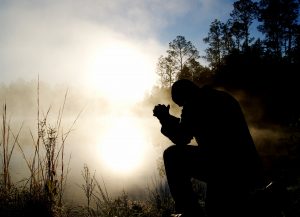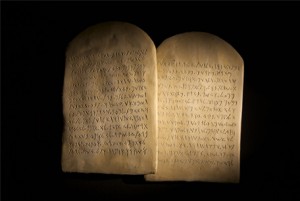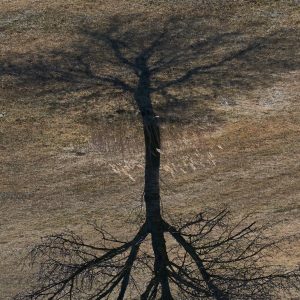JEREMIAH (YIRMEYAHU)
Running with Horses
accidental prophet—kohen (priest) became a vessel of holy fire
© desireofmysoul.faith & SoulBreaths.com. All rights reserved.
First—click this pop-up for a 1-2-3 recap of God's soul-remodeling wilderness call.
READING TIME: 8 MINUTES.
Personally, I really like the 1998 Lux Vid film Jeremiah, directed/written by Harry Winer and starring Patrick Dempsey as the weeping prophet. Yes, it weaves in a non-Biblical, yet quite plausible, plot line here and there—but it also breathes life into Jeremiah’s soul story.
Dempsey hits the right emotional notes, delivering a spiritually encouraging performance—equally matched by the rest of the cast. And if you haven’t guessed, I watch it often.
Jeremiah’s real story begins with God awakening the soon-to-be prophet’s soul, pronouncing his destiny. There would be no discussion, no fiery bush, no staff-turned-snake demonstrations as Adonai had done with Moses.
It would begin with a stirring, voiced in the womb.
Heaven and I wept together,
And its sweet tears were salt with mortal mine.
—The Hound Of Heaven, Francis Thompson
Back story: Around 755 BCE, Amos and Hosea prophesied to the Northern Kingdom of Israel, who had long meshed their Judaism with paganism. Israel ignored the warnings and landed in the middle of God’s divine discipline: Assyrian captivity, 721 BCE after a three-year siege.
But the Southern Kingdom, Judah, wasn’t so quick to learn from the idolatrous falterings of its fellow tribesmen.
According to the Lord: Truth had perished—vanished from their lips. They clung to deceit, no one repented, they refused to return to the Lord’s ways. Each pursued their own course like a horse charging into battle.
And so, along came God’s love call to His nation: Jeremiah.
Born in Anatot—a town given to the tribe of Benjamin, per Joshua 21, about three miles northeast of Jerusalem by way of the Mount of Olives—Jeremiah’s call-to-action probably occurred sometime before he was 25 or 30 . . . old enough to marry, but not yet beginning his rightful kohen (priestly) duties as son of the High Priest, Hilkiah.
Then the Lord reached out His hand
and touched my mouth and said to me,
“Now I have put my words in your mouth.
Today, I have placed you over nations and kingdoms
to uproot and to tear down, to destroy and to demolish,
to build and to plant.”
—Jeremiah 1:9
Jeremiah would be strategically placed in God’s archery bow—launched into dark moments taking him to near death. Yet along the way, spiritually transformed deeper and deeper and deeper still.
Jeremiah, a prophetic voice to a rebellious nation.
A kohen, standing in for Judah before the Lord.
God’s relentless love would trigger
deconstruction (tearing down/captivity) to breathe forth
reconstruction (humbled souls realigned with Him,
a return to their Land,
and Temple restoration).
For twenty years, Jeremiah sounds the alarm of the impending seventy-year Babylonian captivity—which is gradual, done in waves, beginning around 605 BCE, taking princes (like Daniel, Hananiah, Mishael, Azariah) for positions. Then toward the end, the captors deport the poorest of the poor Judeans as slaves.

LIKE MOSES, FEELING UNREADY
Jeremiah’s calling wouldn’t be easy. He pretty much knows that going in. What’s ahead—a lonely soul experience with twists, turns, and chasmic drops—would break off any hardness and self-focus to uncover the soul’s holy hiddenness.
By God’s further command, there would be no wife. And no children. And no living his priestly heritage. No normality on any level.
Only risks and danger—on the wings of a prophetic calling that would voice sorrow, pain, surrender, exile, and the promise of a future redemption for Judah, a nation whose “soul” was under the power of its earthbound vessel. Unwilling, prideful, rebellious, delusional.
But you [Jeremiah], dress for action, stand up,
and tell them everything I order you to say.
Don’t break down or I will break you down in front of them.
For today, I have made you into a fortified city, a pillar of iron,
a wall of bronze against the whole land—against
the kings of Judah,
against its princes, against its cohanim [priests],
and the people of the land.
They [Judah] will fight against you, but will not overcome you,
for I am with you and will rescue you, declares the LORD.
—Jeremiah 1:17-19
Jeremiah’s knee-jerk reaction? Like Moses, the young kohen (priestly family) thought God should look elsewhere. His “I’m only a young man” response in Jeremiah 1:6—the word is na’ar (נַעַר) in the Hebrew text—reveals Jeremiah’s take on his lack of abilities and readiness.
A na’ar is a young man, defined by age (teen through twenties) or of marriageable age, and sometimes rabbinically defined as not yet ready to fulfill his duties/position.
Do you know who else the Bible calls na’ar and not a yeled (ילד, child/boy), despite some biblical translations?
(1) Seventeen-year-old Joseph in Genesis 37:2 when he was with his brothers, tending the flocks
(2) young Samuel in 1 Samuel 3:1 when he first heard God’s voice calling him
(3) Isaac in Genesis 22:5 when Avraham was going to sacrifice him—rabbinic/scholarly thoughts are that Isaac was in his early 30s
Based on Jeremiah’s writings regarding his prophetic calling spanning five kings, his birth is set around 655 BCE. His prophetic calling began in the thirteenth year of King Josiah’s reign—putting him around age 25–29, as mentioned earlier in this post.
Jeremiah 1:6-7
וָאֹמַר, אֲהָהּ אֲדֹנָי יְהוִה, הִנֵּה לֹא-יָדַעְתִּי, דַּבֵּר: כִּי-נַעַר
אָנֹכִי.
And I said, “You are my LORD, ADONAI, here I am (or alas/behold), I don’t know a thing because I am a young man.
וַיֹּאמֶר יְהוָה אֵלַי, אַל-תֹּאמַר נַעַר אָנֹכִי: כִּי עַל-כָּל-אֲשֶׁר
שְׁלָחֲךָ, תֵּלֵךְ, וְאֵת כָּל-אֲשֶׁר אֲצַוְּךָ, תְּדַבֵּר.
And the LORD said to me, you shall not say I am a young man: because wherever I send you, you will go and all that I command you, you will say.
In the natural, I get why Jeremiah tried to excuse himself. To a young man who had yet to spread his wings, the call must have seemed like a galaxy beyond his skill set.
Human viewpoint would say that a man trained in spiritual matters, matured, married, and long observant in his priestly duties is far better suited to attempt the task.
And yet.
Jeremiah may have studied Torah,
but he’d yet to swim in God’s deep, His secret place.
He may have a kohen lineage,
but he’d yet to personally know the power of God.
The journey wasn’t ever about Jeremiah’s strength, knowledge,
bloodline, or abilities.
It was—and always will be—about God and His strength,
plan, power, will.

FIRE IN THE SOUL
This isn’t a mission designed for a single man. God is working in Jeremiah’s soul for his own edification—while working through Jeremiah for Judah’s soul.
Making Jeremiah a fire-and-ice instrument in God’s hands.
A prophetic instrument that would see what God sees, feel what God feels, and experience in the physical what Judah is doing to God in the spiritual. Soul to soul.
Two realms begin to clash—with Jeremiah as both the scapegoat of Judah’s contempt for God’s ways and the conduit for God’s convictions, discipline, and hope.
Jeremiah is becoming God’s prophetic lightning rod.
He attracts the seething anger of Judah . . . while being consumed by God’s righteous, fiery words. Within those blasts of light, Judah’s soul condition is exposed.
There’s no place to hide. No place to run. There’s only surrender.
At times Jeremiah is sad, angry, appalled, and even feels abandoned by God. Other times he’s overcome with grace, mercy, and hope, empowered by His presence.
Don’t know about you, but that emotional flip-flop sounds way too familiar.
I am ridiculed all day long; everyone mocks me . . . so the word of the LORD has brought me insult and reproach all day long. —Jeremiah 20:7b, 8b
But the LORD is with me like a mighty warrior; so my persecutors will stumble and not prevail. —Jeremiah 20:11a
It’s always a matter of who’s on first.
Your soul surrendered to God or
entangled with your earth-focused vessel.
Therein is the battle within the battle.
Jeremiah learns that. The wilderness journey and the battle humble him. Knock the wind out of him along the way. The timing. The disappointments. The rage. The angst. The depression.
Tensions roll over him in every form, on every front. He once walked among the privileged, a kohen. Then he becomes an outcast.
But he can’t, won’t stop. Why? Because he knows his calling. He has surrendered to his king.
Accepts and bears the yoke of the kingdom of heaven—עֹל מַלְכוּת שָׁמַיִם.

RUNNING WITH HORSES
If I say, “I will not mention Him or speak any more in His name,” His word is in my heart like a fire, a fire shut up in my bones. I am weary of holding it in; indeed, I cannot.—Jeremiah 20:9
Atmospheres are challenged when God’s words flow through Jeremiah. But the cost is high. Extremely, gloriously high.
If you’ve run with the footmen and they’ve exhausted you,
then how will you compete against horses?
You may feel secure in a land of peace,
but how will you do in the Yarden’s thick brush?
—Jeremiah 12:5
What is God conveying to Jeremiah? If you can’t keep up with the easier battle campaigns on the ground (footmen) when things aren’t that intense, how will you handle the thick of war?
A slightly closer look via the Hebrew fleshes it out . . .
כִּי אֶת-רַגְלִים רַצְתָּה וַיַּלְאוּךָ,
If you’re running/as in “rushing” (רַצְתָּה) with soldiers/footmen and they’re tiring you out (וַיַּלְאוּךָ)
וְאֵיךְ תְּתַחֲרֶה אֶת-הַסּוּסִים;
then how will you vie for/rival against (תְּתַחֲרֶה) horses [symbolic of army strength, an animal used for war times]
וּבְאֶרֶץ שָׁלוֹם אַתָּה בוֹטֵחַ, וְאֵיךְ
and in the land of peace you confidently trust in (or feel secure in), then how
תַּעֲשֶׂה בִּגְאוֹן הַיַּרְדֵּן.
will you do in the thicket (or raging/swelling or magnificence) of the Jordan?
In its glory days, the Jordan—which means “descender”—had umpteen curves with varying widths, from 75 feet to 200 feet. Many rapids and falls were along its course, which usually had a rapid, strong current.*
Sounds similar to a soul wilderness journey to me.
Being called down into His murmuring deep, descending into a place with rugged terrain and raging waters . . . an uncommon place where God alone is your road map.
Along his destined journey, Jeremiah learns how to focus on what God is doing—not what He’s removingduring that soul wilderness process.
But that’s the thing, isn’t it? When God places any of us in a pressurized soul situation, we see what’s missing.
What’s been taken away.
Diminished.
Lost.
We mourn for what was—and wonder when, if ever, we will return to some state of our previous “normal.”
We long for release and hope for a new normal—the promise of something within that immerses us into His holiness and transforms us so we aren’t even a shadow of our former selves.

PUTTING IT INTO PERSPECTIVE
Life isn’t easy. And trials of any magnitude are disturbing. But the point is . . . are you first seeking God and believing His Word, following His leading, and getting covered in prayer from trusted believers in Him—or is your soul-dial set for auto-tilt?
You know, your spiritual compass hitting a “10” on the frustration richter scale.
Believe me, I’ve been there and can return in no time—if I’m not staying in His flow.
That’s why Jeremiah 12:5 is special to me. God used it often to encourage me during one of my extremely difficult wilderness journeys.
When I didn’t think I could take another step, another hit, another disappointment—newly widowed, family issues, uncertainties on so many levels—He’d given me a vision . . . allowing me to see and hear the stampeding hooves of mighty horses.
Would I run with them or fall to the side? If these spiritual battles—in times of relative national peace with challenges common to humanity—get me down, how would I ever finish the race against tougher enemies?
And what would I do in times of more difficult hardships or even persecution?
My soul knew the answer. It had to keep pushing forward in Him and with Him. But I had no strength on my own.
Throughout that five-year process (and counting), I had to take it step by step, soul breath by soul breath.
I’m in process, learning to rest on this truth in Jeremiah 20:11.
God is with me like a mighty warrior.
Read all the Soul Remodeling stories:
*Stats on Jordan from biblehub.com
PHOTO CREDITS:
Horse photo by Michael Anfange on Unsplash
Desert photo by Eddie and Carolina Stigson on Unsplash
Girl Looking Out photo by Edgar Hernandez on Unsplash
Article created July 28, 2015.




















